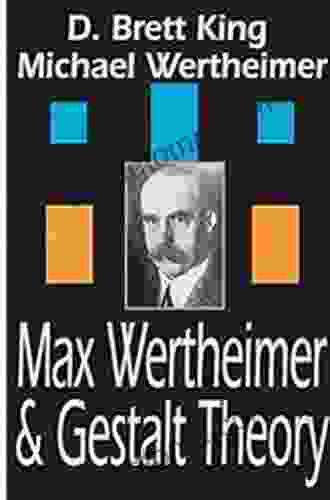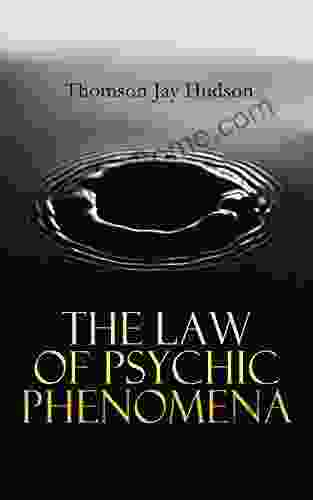Max Wertheimer and Gestalt Theory: A Journey into the Mind's Eye

Max Wertheimer, the father of Gestalt psychology, was a brilliant German psychologist who made groundbreaking contributions to our understanding of perception, cognition, and the nature of consciousness. Gestalt psychology, which Wertheimer founded in the early 1900s, emphasized the importance of wholes and patterns in perception and cognition, as opposed to the reductionist approach of traditional psychology, which focused on breaking down experiences into their constituent parts.
Wertheimer's work on Gestalt theory had a profound impact on the field of psychology, and his ideas continue to be influential today. In this article, we will explore the life and work of Max Wertheimer, and we will delve into the principles of Gestalt theory. We will also discuss the applications of Gestalt theory in a variety of fields, including psychology, education, and design.
4.7 out of 5
| Language | : | English |
| File size | : | 4224 KB |
| Text-to-Speech | : | Enabled |
| Screen Reader | : | Supported |
| Enhanced typesetting | : | Enabled |
| Word Wise | : | Enabled |
| Print length | : | 453 pages |
The Life and Work of Max Wertheimer
Max Wertheimer was born in Prague, Czech Republic, in 1880. He studied law at the University of Prague, but he soon became interested in psychology. In 1904, he moved to Berlin to study psychology under Carl Stumpf, one of the leading psychologists of the time. Wertheimer's doctoral dissertation, which he completed in 1908, was on the perception of motion. In this dissertation, Wertheimer introduced the concept of the phi phenomenon, which is the illusion of motion that occurs when two stationary lights are flashed in rapid succession.
The phi phenomenon was a major breakthrough in the field of psychology, as it demonstrated that perception is not simply the sum of its parts. Wertheimer's work on the phi phenomenon led him to develop the theory of Gestalt psychology. Gestalt psychology is based on the idea that the mind organizes sensory information into wholes and patterns. Wertheimer believed that the whole is greater than the sum of its parts, and that perception is not a passive process, but an active process of organizing and interpreting sensory information.
Wertheimer's work on Gestalt theory had a profound impact on the field of psychology. Gestalt psychology challenged the traditional view of perception as a passive process of receiving sensory information. Wertheimer's work showed that the mind is an active participant in perception, and that it organizes sensory information into meaningful wholes and patterns.
The Principles of Gestalt Theory
Gestalt theory is based on a number of principles, including:
- The principle of **closure**: The mind tends to fill in gaps and complete incomplete figures. For example, we see a circle as a complete figure, even if there is a small gap in the line.
- The principle of **similarity**: The mind tends to group together similar objects. For example, we see a group of dots as a cluster, even if the dots are not all the same size or shape.
- The principle of **proximity**: The mind tends to group together objects that are close together. For example, we see a group of letters as a word, even if the letters are not all the same size or shape.
- The principle of **good continuation**: The mind tends to see lines as continuing in the same direction. For example, we see a broken line as a single line, even if there is a gap in the line.
These principles of Gestalt theory help us to understand how we perceive the world around us. The mind is not a passive recipient of sensory information, but an active participant in organizing and interpreting sensory information. Gestalt theory has had a profound impact on our understanding of perception, cognition, and the nature of consciousness.
Applications of Gestalt Theory
Gestalt theory has been applied in a variety of fields, including psychology, education, and design. In psychology, Gestalt theory has been used to study a wide range of topics, including perception, cognition, and problem-solving. In education, Gestalt theory has been used to develop new teaching methods that are based on the principles of Gestalt psychology. In design, Gestalt theory has been used to create more effective and user-friendly designs.
Gestalt theory is a powerful tool that can be used to understand a variety of human behaviors. The principles of Gestalt theory can be applied to a wide range of fields, including psychology, education, and design. Gestalt theory can help us to understand how we perceive the world around us, how we learn, and how we solve problems. Gestalt theory is a valuable tool that can help us to live more effective and fulfilling lives.
Max Wertheimer was a brilliant psychologist who made groundbreaking contributions to our understanding of perception, cognition, and the nature of consciousness. Gestalt psychology, which Wertheimer founded in the early 1900s, emphasized the importance of wholes and patterns in perception and cognition. Gestalt psychology has had a profound impact on the field of psychology, and its principles continue to be influential today.
If you are interested in learning more about Gestalt theory, I encourage you to read Max Wertheimer's classic book, "Principles of Gestalt Psychology". This book is a seminal work in the field of psychology, and it is a must-read for anyone who is interested in the history of psychology or the nature of perception and cognition.
4.7 out of 5
| Language | : | English |
| File size | : | 4224 KB |
| Text-to-Speech | : | Enabled |
| Screen Reader | : | Supported |
| Enhanced typesetting | : | Enabled |
| Word Wise | : | Enabled |
| Print length | : | 453 pages |
Do you want to contribute by writing guest posts on this blog?
Please contact us and send us a resume of previous articles that you have written.
 Book
Book Novel
Novel Page
Page Chapter
Chapter Text
Text Story
Story Genre
Genre Reader
Reader Library
Library Paperback
Paperback E-book
E-book Magazine
Magazine Newspaper
Newspaper Paragraph
Paragraph Sentence
Sentence Bookmark
Bookmark Shelf
Shelf Glossary
Glossary Bibliography
Bibliography Foreword
Foreword Preface
Preface Synopsis
Synopsis Annotation
Annotation Footnote
Footnote Manuscript
Manuscript Scroll
Scroll Codex
Codex Tome
Tome Bestseller
Bestseller Classics
Classics Library card
Library card Narrative
Narrative Biography
Biography Autobiography
Autobiography Memoir
Memoir Reference
Reference Encyclopedia
Encyclopedia Keri Arthur
Keri Arthur Sylvia Browne
Sylvia Browne Richard Carlson
Richard Carlson Thomas Paine
Thomas Paine Toby Lester
Toby Lester Ted Floyd
Ted Floyd Victoria King Heinsen
Victoria King Heinsen Sukhdev Virdee
Sukhdev Virdee Stacey Davis
Stacey Davis Steven Peacock
Steven Peacock Stuart Sime
Stuart Sime Tammy Nelson
Tammy Nelson Tao Pang
Tao Pang Sverre Holm
Sverre Holm Scott Abel
Scott Abel Yue Zhang
Yue Zhang Edward J P Aniston
Edward J P Aniston Ray Simpson
Ray Simpson Akash Karia
Akash Karia Vivek Kamath
Vivek Kamath
Light bulbAdvertise smarter! Our strategic ad space ensures maximum exposure. Reserve your spot today!
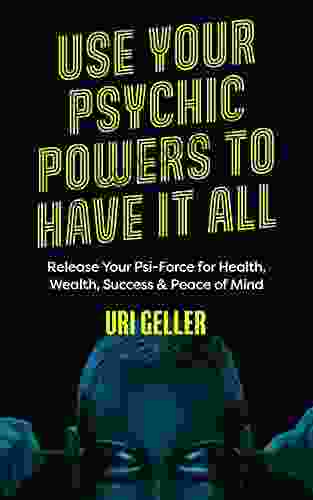
 Dakota PowellUnlock the Secrets of Your Mind: Use Your Psychic Powers to Live Your Best...
Dakota PowellUnlock the Secrets of Your Mind: Use Your Psychic Powers to Live Your Best...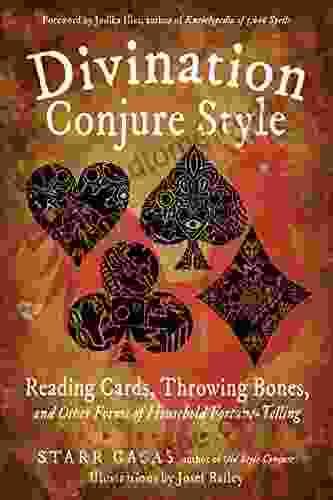
 Dave SimmonsReading Cards, Throwing Bones, and Other Forms of Household Fortune Telling:...
Dave SimmonsReading Cards, Throwing Bones, and Other Forms of Household Fortune Telling:... Jamie BlairFollow ·4.3k
Jamie BlairFollow ·4.3k Isaac BellFollow ·8.8k
Isaac BellFollow ·8.8k Corbin PowellFollow ·4.2k
Corbin PowellFollow ·4.2k Leo MitchellFollow ·16.2k
Leo MitchellFollow ·16.2k Derek CookFollow ·4.9k
Derek CookFollow ·4.9k Theodore MitchellFollow ·12.4k
Theodore MitchellFollow ·12.4k Jedidiah HayesFollow ·10.9k
Jedidiah HayesFollow ·10.9k Eugene PowellFollow ·13.3k
Eugene PowellFollow ·13.3k
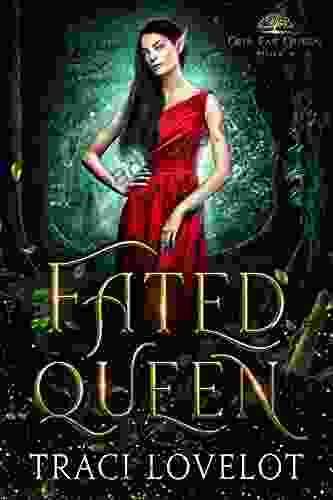
 Timothy Ward
Timothy WardSteamy Reverse Harem with MFM Threesome: Our Fae Queen
By [Author...
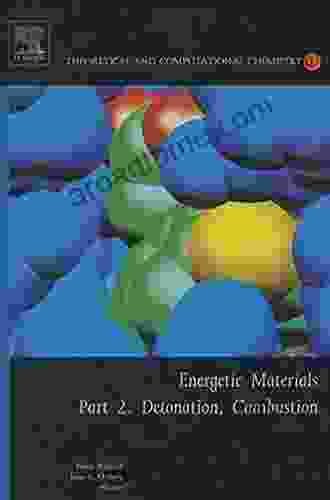
 Cody Blair
Cody BlairThe Ultimate Guide to Energetic Materials: Detonation and...
Energetic materials are a fascinating and...
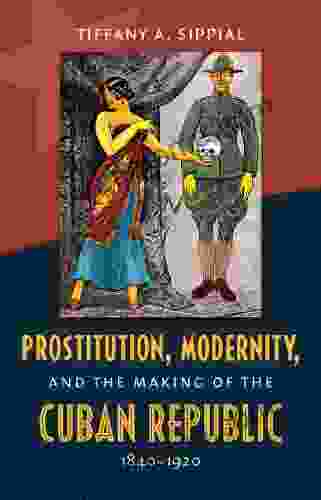
 Kenzaburō Ōe
Kenzaburō ŌeProstitution, Modernity, and the Making of the Cuban...
By Emily A....

 Kirk Hayes
Kirk HayesUnveil the Enchanting World of The Rape of the Lock by...
Alexander Pope's epic...
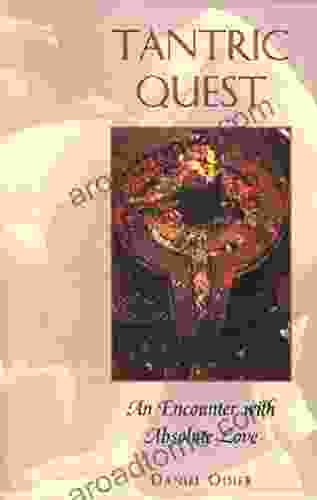
 Ivan Turgenev
Ivan TurgenevTantric Quest: An Encounter With Absolute Love
Embark on a Tantric Quest to...
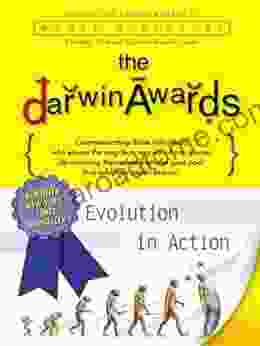
 Gary Reed
Gary ReedThe Darwin Awards: Evolution in Action
The Darwin Awards are a...
4.7 out of 5
| Language | : | English |
| File size | : | 4224 KB |
| Text-to-Speech | : | Enabled |
| Screen Reader | : | Supported |
| Enhanced typesetting | : | Enabled |
| Word Wise | : | Enabled |
| Print length | : | 453 pages |


